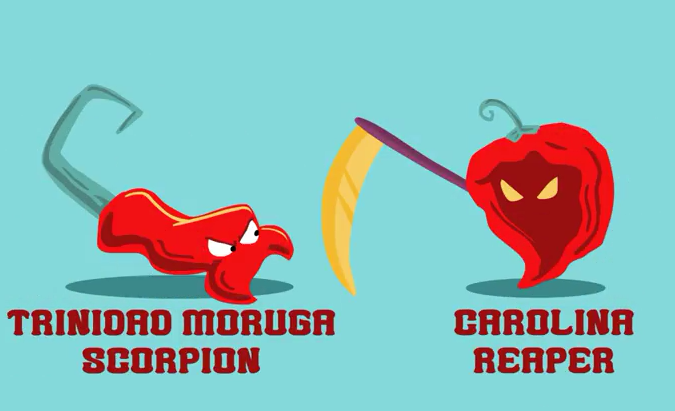The standard measure of a food's spiciness is its rating on the Scoville scale,
食物辣度的標準計量方法是借助史高維爾辣度單位測量,
which measures how much its capsaicin content can be diluted before the heat is no longer detectable to humans.
方法是不斷稀釋被測物中的辣椒素,直到人感覺不到辣為止,稀釋液體的總和即是被測物的史高維爾辣度單位。
A sweet bell pepper gets 0 Scoville heat units, while Tabasco sauce clocks in between 1,200-2,400 units.
甜椒的史高維爾辣度單位是0,塔巴斯科辣沙司的辣度單位在1200-2400之間。
The race to create the hottest pepper is a constant battle, but two peppers generally come out on top:
現(xiàn)在,培植最辣辣椒儼然成為一種國際競賽,
The Trinidad Moruga Scorpion and the Carolina Reaper.
目前公認最辣的兩種辣椒是千里達莫魯加毒蝎椒和卡羅來納死神辣椒。
These peppers measure between 1.5 and 2 million Scoville heat units, which is about half the units found in pepper spray.
這兩種辣椒的史高維爾辣度單位在150-200萬之間,相當于一半的辣椒噴霧劑辣度單位。
So, why would anyone want to eat something that causes such high levels of pain?
為什么有人愿意吃能造成如此巨大痛苦的食物呢?
Nobody really knows when or why humans started eating hot peppers.
我們無法得知人類最早食用辣椒的時間和原因。

Archaeologists have found spices like mustard along with human artifacts dating as far back as 23,000 years ago.
考古學家從兩萬三千多年前的古人類器皿中發(fā)現(xiàn)了類似芥末的香料。
But they don't know whether the spices were used for food or medication or just decoration.
但尚不明確這些香料是用作調(diào)味、治病,還是僅僅作為裝飾。
More recently, a 6,000 year old crockpot, lined with charred fish and meat, also contained mustard.
最近,考古學家還發(fā)現(xiàn)一個六千多年前的瓦罐罐旁有烤魚和烤肉的遺跡罐內(nèi)有芥末。
One theory says that humans starting adding spices to food to kill off bacteria.
有觀點認為古人類從這時開始在食物中加入香料以此殺菌。
And some studies show that spice developed mostly in warmer climates where microbes also happen to be more prevalent.
一些研究顯示,在古代,香料主要生長在氣候較熱的地區(qū)而這些地方也更容易滋生細菌。
But why we continue to subject ourselves to spicy food today is still a bit of a mystery.
至于為什么人類到了今天仍對辛辣食物欲罷不能還是個解不開的謎團。
For some people, eating spicy food is like riding rollercoasters;
對一些人來說吃辛辣的食物就像坐過山車,
they enjoy the ensuing thrill, even if the immediate sensation is unpleasant.
雖然當時最直接的感受并不舒服,但他們非常享受隨之而來的刺激感。
Some studies have even shown that those who like to eat hot stuff are more likely to enjoy other adrenaline-rich activities, like gambling.
還有研究顯示喜歡吃辣食的人也更樂于從事其他能激起腎上腺素的活動,比如賭博。
The taste for spicy food may even be genetic.
對辛辣食物的喜好程度甚至也有遺傳的因素。
And if you're thinking about training a bit, to up your tolerance for spice, know this:
如果你想訓練得自己更能吃辣,有這么幾條信息跟您分享:
According to some studies, the pain doesn't get any better.
一些研究顯示辣帶來的灼燒感從不會減輕。
You just get tougher. In fact, researchers have found that people who like to eat spicy foods don't rate the burn any less painful than those who don't.
只是吃辣的人的忍耐力提高了。研究人員發(fā)現(xiàn)喜歡吃辣食的人跟不喜歡吃辣食的人體驗到的辛辣感是一樣的。
They just seem to like the pain more.
只是喜歡吃辣的人更享受那種灼燒感。
So, torment your heat receptors all you want, but remember, when it comes to spicy food, you're going to get burned.
所以,盡情磨練你的熱覺感受器吧,不過要記住,當你吃辣食的時候大腦會認為你被灼燙了。


